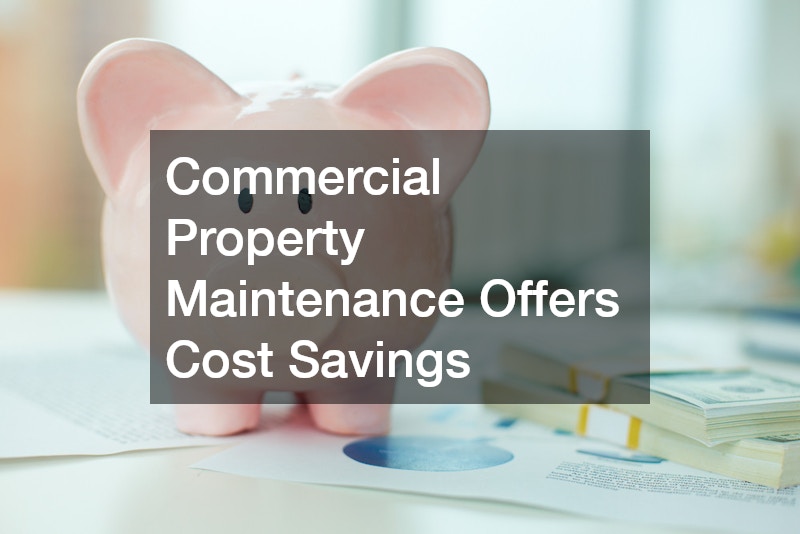When managing a commercial property, regular maintenance is critical to ensuring the building remains functional, safe, and attractive. Commercial property maintenance involves a variety of tasks designed to prolong the life of the property, keep tenants satisfied, and adhere to legal regulations. Whether you’re a property owner or a manager, understanding the full scope of maintenance requirements can help you make informed decisions and maintain the value of the property.
Types of Commercial Property Maintenance
Commercial property maintenance covers various tasks, and it can be broadly categorized into two main types: preventive maintenance and corrective maintenance.
Preventive Maintenance: This type of maintenance is proactive, aimed at preventing issues before they arise. It includes routine tasks such as HVAC system checks, plumbing inspections, and electrical system servicing. Preventive maintenance helps reduce the risk of costly repairs in the future, keeps the property in optimal condition, and ensures compliance with health and safety regulations.
Corrective Maintenance: This type of maintenance involves fixing issues that have already occurred. It could be anything from a leaky roof to a broken elevator. Corrective maintenance is reactive and often comes with a higher cost due to the urgency of repairs.
Key Areas of Commercial Property Maintenance
To maintain a commercial property efficiently, it’s essential to break down the responsibilities into key areas. Here are the most important aspects of commercial property maintenance:
1. HVAC Systems
A well-maintained HVAC (Heating, Ventilation, and Air Conditioning) system is crucial for maintaining a comfortable indoor environment. Regular inspections and cleaning of ducts, filters, and vents can help prevent system breakdowns, reduce energy consumption, and ensure indoor air quality. HVAC maintenance also includes monitoring the thermostat, replacing filters regularly, and having professionals check for refrigerant leaks.
2. Plumbing Systems
Commercial plumbing systems are often more complex than residential ones, as they must accommodate more significant usage. Regular plumbing maintenance involves inspecting pipes, water heaters, sewage systems, and toilets to prevent leaks, clogs, or water damage. Routine checks can help identify potential issues before they lead to expensive repairs. Ensuring proper water pressure and addressing any drainage issues is crucial for keeping the property functional and avoiding water-related disruptions.
3. Electrical Systems
The electrical systems of a commercial building power lighting, computers, elevators, security systems, and other essential equipment. Regular maintenance of the electrical systems ensures that circuits, switches, and panels are functioning properly, minimizing the risk of outages or dangerous electrical fires. Electrical inspections can help catch issues like faulty wiring, exposed cables, and potential overloads.
4. Roofing
The roof of a commercial property is exposed to constant wear from weather conditions like rain, snow, heat, and wind. Regular roof inspections are necessary to spot damage like leaks, cracks, or loose shingles that could cause extensive damage to the building. Preventive maintenance, such as cleaning gutters and ensuring proper insulation, helps extend the life of the roof and prevent major water damage to the property.
5. Landscaping and Groundskeeping
The exterior of your commercial property plays a significant role in making a first impression. A well-kept landscape with manicured lawns, healthy plants, and clean walkways enhances the building’s curb appeal. Groundskeeping tasks also include snow removal, pressure washing sidewalks, and ensuring the parking lot is safe and clean. Regular landscaping maintenance can boost the property’s value and create a welcoming atmosphere for tenants, visitors, and employees.
6. Safety and Security Systems
Maintaining a safe and secure environment is a top priority for any commercial property. This includes ensuring that fire alarms, sprinkler systems, and emergency exits are functioning correctly. Periodic inspections of security systems, such as cameras, gates, and lighting, can prevent break-ins and vandalism. Installing smoke detectors, carbon monoxide detectors, and other safety devices is crucial to comply with local regulations and protect everyone on the premises.
7. Pest Control
Unwelcome pests can cause significant damage to a commercial property if left unchecked. Regular pest control inspections are necessary to detect and prevent infestations of rodents, insects, or other pests that could damage the building, create health hazards, or disrupt business operations. Regular treatments by pest control professionals can help keep the property pest-free.
8. Interior Maintenance
Interior maintenance ensures that common areas like hallways, restrooms, elevators, and lobbies remain clean, functional, and appealing. This includes tasks like painting, carpet cleaning, fixing broken tiles, and maintaining restroom facilities. A clean and comfortable interior environment is essential for tenant satisfaction and maintaining the property’s value.
Benefits of Commercial Property Maintenance
The importance of consistent maintenance cannot be overstated. Here are several benefits that come from maintaining a commercial property properly:
Cost Savings: Preventive maintenance helps catch small problems before they become costly repairs. Regular inspections and servicing of equipment, HVAC systems, and plumbing can extend their lifespan and save on emergency repair costs.
Increased Property Value: A well-maintained property retains its value over time. Routine maintenance, including exterior and interior upkeep, can help you attract and retain high-quality tenants and increase rental rates.
Enhanced Tenant Satisfaction: When the property is well-maintained, tenants are more likely to remain satisfied and renew their leases. A clean, functional building fosters a positive work environment, which can also improve tenant retention.
Compliance with Legal Standards: Various local, state, and federal regulations mandate specific maintenance tasks, such as fire safety checks, elevator inspections, and electrical systems compliance. Proper maintenance ensures that the property stays in line with these laws, avoiding fines or legal issues.
Improved Safety: Regular maintenance of electrical, plumbing, and HVAC systems ensures that the property remains safe for tenants, visitors, and employees. It reduces the risk of accidents like fire, flooding, or electrical failures.
Watch the video above to learn more!
.


